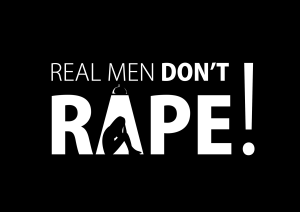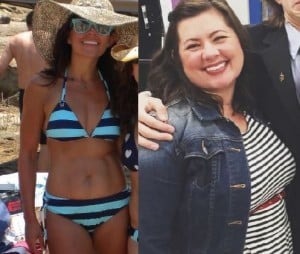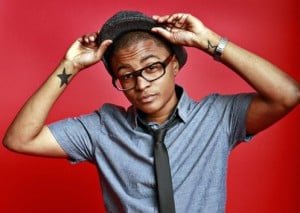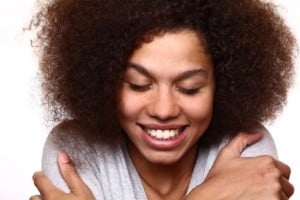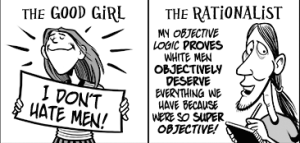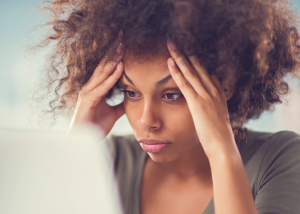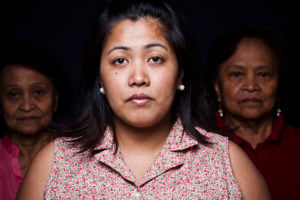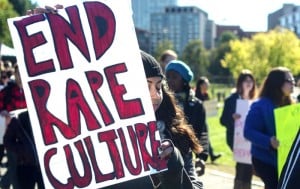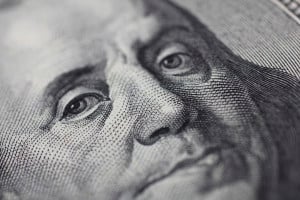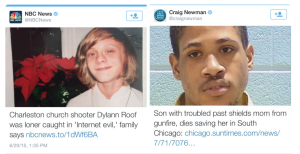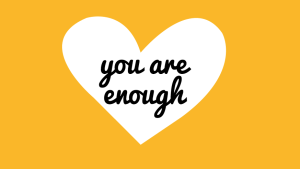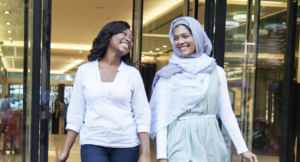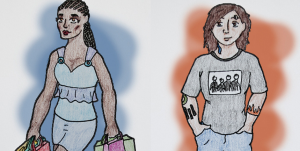Today, I’m going to be a beauty vlogger, but—like—not the kind that has perfectly winged eyeliner or the bombest lipstick. Except… (shows off makeup for camera, flips hair)
Nah. Today, I want to talk about the concept of beauty and what its place in the body acceptance movement is. Because you might think this is a no-brainer, but that’s probably because you’re sitting on one of two sides of a fence. Because there’s a little bit of a debate about it.
On the one hand, some people say that beauty is something that all people should be entitled to feel. Think slogans like “All Bodies Are Beautiful.” The idea here is that because beauty is a socially constructed idea, we can redefine its parameters and let everybody into the party!
On the other hand, some folks say that beauty is inherently meaningless, not to mention oppressive, and that it shouldn’t hold value in the first place. The idea here is that because beauty is a socially constructed idea, we should just obliterate it altogether and entirely stop focusing on aesthetics as a source of value.
In the past, I’ve sat firmly in both camps, which means that our feelings on this are absolutely allowed to be fluid – and, I think, that both notions can be valuable. But lately, I’ve been feeling more like we can have our cake and eat it, too – and that both of these approaches can (and maybe should) happen at the same time.
So let’s talk about where the idea of beauty came from in the first place, and then deconstruct how we can approach it as body acceptance activists.
What Is Beauty Anyway?
Beauty, in short, is a combination of qualities or attributes that please the aesthetic senses – generally, sight.
Beauty, of course, is in the eye of the beholder, and each of us probably finds different things attractive. My “type” and your “type” (whether we’re talking about sexual or romantic partners or—like—art) may be completely different, but they’re still equally beautiful to us individually – and that’s totally valid.
The idea of beauty is complicated, though, because it’s not just about our own personal preferences and attractions. Our concepts of beauty, especially as they apply to other people, also have biological and sociohistorical foundations, which affects how we perceive them.
Biologically, who we find attractive should be based in who would make the best mate. Generally speaking, from a strictly instinctual standpoint, that means people who seem the healthiest. (whispers) Evolutionary science is a little bit ableist. If the limbic system in our brains is all about survival of our species, then we should be attracted to people who we think might be fertile. According to an essentialist perspective of science, this is usually related to youth and perceived health status, marking stuff like clear skin, lustrous hair, and—well—the absence of lesions as attributes to look for.
But our cultural and historical positions matter, too. Because both the concepts of health and beauty – as well as how they may be related – shift depending on where in the world you are and what time period you’re in. For example, at times and in places when and where access to food is harder to come by and famine is a concern, larger, lusher, well-fed bodies are more often seen as the beauty ideal because they represent health. But in our sociohistorical positioning, whereby in many ways, there is an abundance of food and concern around overeating, thinner bodies are seen as the beauty ideal because they represent health.
And these two paradigms help explain why some people think that beauty has a shit-ton of value and why others think it’s meaningless. Some say that beauty will always matter because we’re evolutionarily wired to be attracted to it. And others will say that how we understand beauty is clearly dependent on social factors, so it has no inherent purpose.
Does Beauty Hold Value?
Here’s where things get kind of sticky.
On the one hand, I agree that the existence of beauty standards turns what essentialists want to call “attraction” into a weapon of oppression. When cultural elites hold the power to name what’s beautiful and what’s not (or even what’s healthy and what’s not), that power can be used (and is used) to keep others down.
In the trailer to the upcoming documentary Fattitude, my friend Virgie Tovar says, in regards to how we talk about “fat,” for instance, which is a byproduct of how we talk about beauty, that we can use that language all we want, but, quote, “Make no mistake: We’re talking about gender, we’re talking about race, and we’re talking about class.”
Upholding the beauty ideal is upholding oppression. Because the beauty ideal is one in which oppressed groups – like women, trans and gender non-conforming folks, people of color, disabled people, and poor and working class people – are left out. When being seen, culturally, as beautiful means being a certain size; having certain facial features; adhering to a gender binary; having an able mind and body; having light skin, hair, and eyes; and having the money for certain clothes, hair cuts, makeup, whatever, then that creates a standard of beauty that very few people fit into.
And as if that’s not bad enough, we also hold beauty in high regard. Especially for women, beauty is the number one most important thing that we’re supposed to be. Forget smart, forget sensitive, forget thoughtful, funny, resourceful, talented. Women, first and foremost, should be beautiful to have value as people.
So when you combine the fact that beauty, especially for women, is held in high regard as a necessary trait that we have to have with the fact that it’s almost impossible to fit into society’s standard of beauty, it’s no wonder people are pissed.
So when people say “Fuck the beauty ideal! Let’s destroy beauty as a valuable commodity,” I totally get where they’re coming from. Because we shouldn’t be holding people up to those standards in the first place and judging their worth based on how well they meet them. There’s a lot of pain associated with those standards, and there’s a lot of violence that’s inflicted because of them, too. And so long as we believe that beauty is significant and worth striving toward, the longer people will be oppressed by beauty.
However, there are also people who feel like by virtue of feeling beautiful and showing off their confidence in the face of oppressive beauty standards, we can also destroy the beauty ideal. For example, if you scroll through Instagram and see images of fat people, trans people, disabled people, people of color, and more owning their beauty and their happiness with and in their bodies, despite cultural messages telling them that their bodies make them worthless, what does that do to our concept of what beauty means?
Some people see these images and say that people are objectifying themselves, devaluing themselves, seeing themselves as only or primarily bodies, and commodifying themselves by trying to invite themselves into an oppressive system. And these people say, “No, no. We shouldn’t want to be ‘beautiful’ in the first place. Beauty is irrelevant.”
But then there are others who see these images and feel empowered, confident, and attractive – and like the beauty ideal that’s been force-fed to them is total bullshit, that there are all sorts of ways to be beautiful. And I think that’s powerful, too, especially insofar as what it can do for marginalized people who never see bodies like theirs represented as valuable.
Should We Want to Feel Beautiful?
Really, what this comes down to is: Should we want to feel beautiful? Is wanting to feel like our bodies and our beauties are valuable a bad thing? My take on it is that it’s kick-ass and radical to be able to say “Fuck the system!” and I’m down for fucking up the entire oppressive system.
But I also think that, in the meantime, we’re living in that system. We’re living in a beauty-obsessed, capitalist system that makes our day-to-day lives really hard. Can we blame people for wanting to feel beautiful within a culture that values beauty over all else? I don’t think so. And I’m okay with folks finding their own ways to smash that shit.
I think it takes all kinds of efforts to take down patriarchy and other systems of power. And my hope for you is that you find the niche that feels good to you – and that we can work together to eventually obliterate the oppression that standards of beauty uphold.
Until next time… (blows kiss)
This video was made in collaboration with Everyday Feminism, a website dedicated to helping you break down and stand up to everyday oppression.





